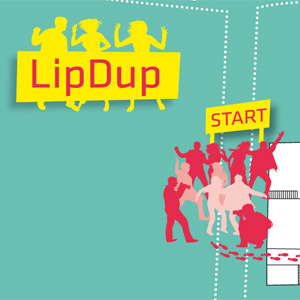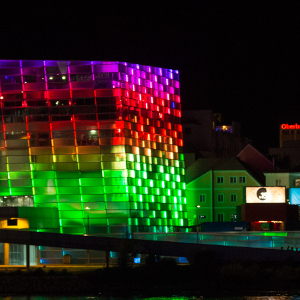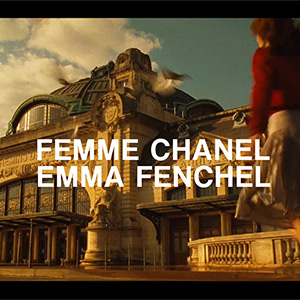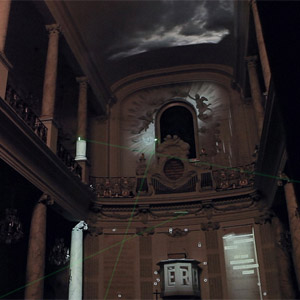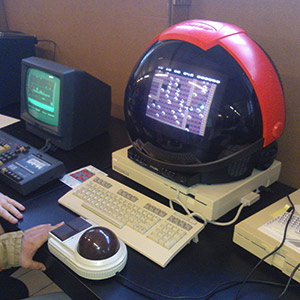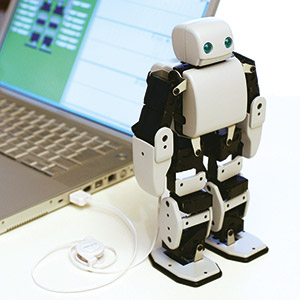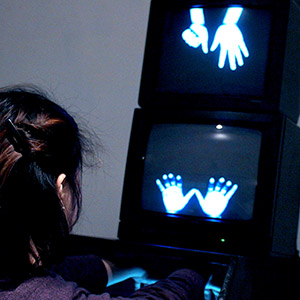u19 – CREATE YOUR WORLD is the future festival of the next generation. It’s dedicated to the development and exchange of ideas, solutions to problems, concepts and experiments for the future. This year’s hub is the courtyard of the Akademisches Gymnasium, a high school in downtown Linz, where artists, programmers and tinkerers age 18 and under show how they’d like the world of tomorrow to be. Here’s the lineup: https://ars.electronica.art/u19/festival-about/programm-2014.
LipDub
If you happen to see a torrent of merry folks from diverse ethnic and social backgrounds dancing their way through downtown Linz while lip-syncing a blaring playback of ABBA’s hit song Take A Chance on Me, then you might think that Mardi Gras is awfully late this year or mass lunacy has broken out. But never mind, what’s underway is merely a collective emotional experiment.
If you happen to see a torrent of merry folks from diverse ethnic and social backgrounds dancing their way through downtown Linz while lip-syncing a blaring playback of ABBA’s hit song Take A Chance on Me, then you might think that Mardi Gras is awfully late this year or mass lunacy has broken out. But never mind, what’s underway is merely a collective emotional experiment.
Connecting Cities: A European Network of Media Facades
Connecting Cities is a worldwide expanding network aiming to build up a connected infrastructure of media facades, urban screens and other digital projection sites to circulate artistic and socially relevant content.
Connecting Cities is a worldwide expanding network aiming to build up a connected infrastructure of media facades, urban screens and other digital projection sites to circulate artistic and socially relevant content.
u19 Exhibit
Film is the theme of the 2014 u19 – CREATE YOUR WORLD Future Festival of the Next Generation. And that’s a happy happenstance, since this year’s Golden Nica winner in the Prix Ars Electronica’s u19 - CREATE YOUR WORLD category, Sarah Oos, is being honored for “Femme Chanel – Emma Fenchel”, a film montage that makes use of found footage.
Film is the theme of the 2014 u19 – CREATE YOUR WORLD Future Festival of the Next Generation. And that’s a happy happenstance, since this year’s Golden Nica winner in the Prix Ars Electronica’s u19 - CREATE YOUR WORLD category, Sarah Oos, is being honored for “Femme Chanel – Emma Fenchel”, a film montage that makes use of found footage.
Archifon III
As different as the Ars Electronica Center and Linz’s St. Mary’s Cathedral may be in every imaginable respect, they’ll have something in common during Ars Electronica 2014: festivalgoers will be able to employ the façades of both buildings as projection surfaces.
As different as the Ars Electronica Center and Linz’s St. Mary’s Cathedral may be in every imaginable respect, they’ll have something in common during Ars Electronica 2014: festivalgoers will be able to employ the façades of both buildings as projection surfaces.
Teh House of Pong
To illustrate the evolution of computer games Teh House of Pong compares iconic games from the past with recent games. The direct comparison of old and recent games shows both breaks and continuities in the technology, the game design and the visual style.
To illustrate the evolution of computer games Teh House of Pong compares iconic games from the past with recent games. The direct comparison of old and recent games shows both breaks and continuities in the technology, the game design and the visual style.
PLEN
PLEN is an open source printable bipedal walking humanoid robot. Since all its constituent control circuits, software and mechanical designs are universally accessible, technicians and artists can use PLEN as a platform for their own diversifying development processes.
PLEN is an open source printable bipedal walking humanoid robot. Since all its constituent control circuits, software and mechanical designs are universally accessible, technicians and artists can use PLEN as a platform for their own diversifying development processes.
Iris
Iris is a pair of hands that communicates with participants by hand gestures solely. Through interacting with Iris, audience will then discover and create the language to “talk” with her, which leads to the investigation of human’s behavioural codes by manifesting hand gestures in a mischievous manner.
Iris is a pair of hands that communicates with participants by hand gestures solely. Through interacting with Iris, audience will then discover and create the language to “talk” with her, which leads to the investigation of human’s behavioural codes by manifesting hand gestures in a mischievous manner.


